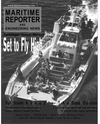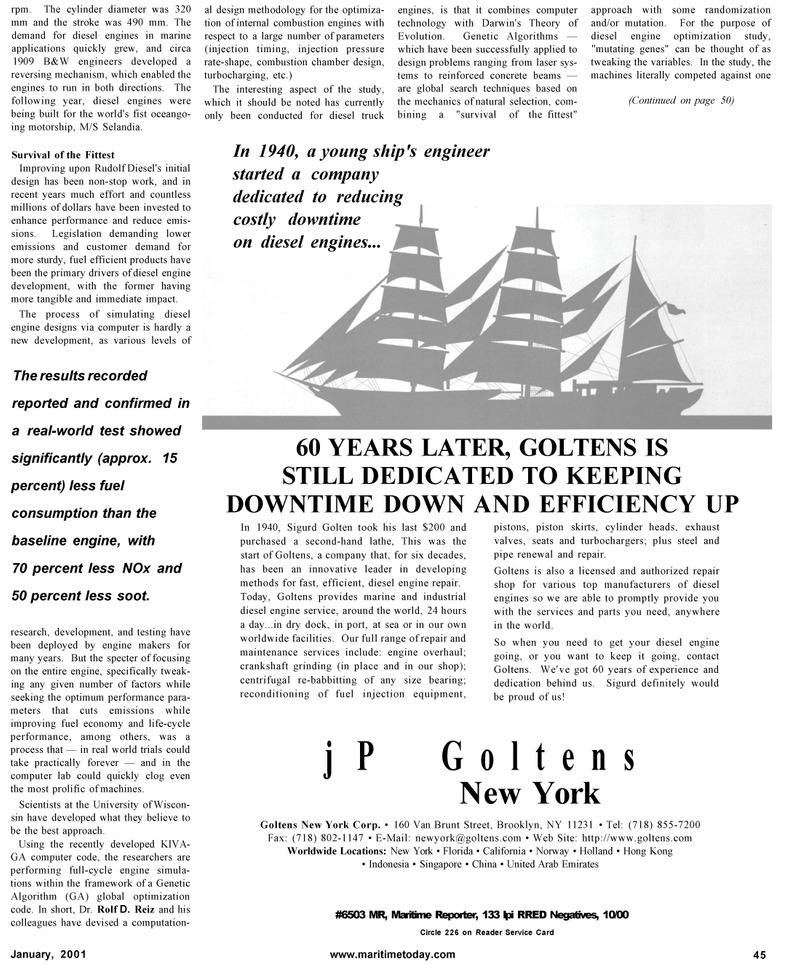
Page 45: of Maritime Reporter Magazine (January 2001)
Read this page in Pdf, Flash or Html5 edition of January 2001 Maritime Reporter Magazine
rpm. The cylinder diameter was 320 mm and the stroke was 490 mm. The demand for diesel engines in marine applications quickly grew, and circa 1909 B&W engineers developed a reversing mechanism, which enabled the engines to run in both directions. The following year, diesel engines were being built for the world's fist oceango- ing motorship, M/S Selandia.
Survival of the Fittest
Improving upon Rudolf Diesel's initial design has been non-stop work, and in recent years much effort and countless millions of dollars have been invested to enhance performance and reduce emis- sions. Legislation demanding lower emissions and customer demand for more sturdy, fuel efficient products have been the primary drivers of diesel engine development, with the former having more tangible and immediate impact.
The process of simulating diesel engine designs via computer is hardly a new development, as various levels of
The results recorded reported and confirmed in a real-world test showed significantly (approx. 15 percent) less fuel consumption than the baseline engine, with 70 percent less NOx and 50 percent less soot. research, development, and testing have been deployed by engine makers for many years. But the specter of focusing on the entire engine, specifically tweak- ing any given number of factors while seeking the optimum performance para- meters that cuts emissions while improving fuel economy and life-cycle performance, among others, was a process that — in real world trials could take practically forever — and in the computer lab could quickly clog even the most prolific of machines.
Scientists at the University of Wiscon- sin have developed what they believe to be the best approach.
Using the recently developed KIVA-
GA computer code, the researchers are performing full-cycle engine simula- tions within the framework of a Genetic
Algorithm (GA) global optimization code. In short, Dr. Rolf D. Reiz and his colleagues have devised a computation- al design methodology for the optimiza- tion of internal combustion engines with respect to a large number of parameters (injection timing, injection pressure rate-shape, combustion chamber design, turbocharging, etc.)
The interesting aspect of the study, which it should be noted has currently only been conducted for diesel truck engines, is that it combines computer technology with Darwin's Theory of
Evolution. Genetic Algorithms — which have been successfully applied to design problems ranging from laser sys- tems to reinforced concrete beams — are global search techniques based on the mechanics of natural selection, com- bining a "survival of the fittest" approach with some randomization and/or mutation. For the purpose of diesel engine optimization study, "mutating genes" can be thought of as tweaking the variables. In the study, the machines literally competed against one (Continued on page 50)
In 1940, a young ship's engineer started a company dedicated to reducing costly downtime on diesel engines... 60 YEARS LATER, GOLTENS IS
STILL DEDICATED TO KEEPING
DOWNTIME DOWN AND EFFICIENCY UP
In 1940, Sigurd Golten took his last $200 and purchased a second-hand lathe, This was the start of Goltens, a company that, for six decades, has been an innovative leader in developing methods for fast, efficient, diesel engine repair.
Today, Goltens provides marine and industrial diesel engine service, around the world, 24 hours a day...in dry dock, in port, at sea or in our own worldwide facilities. Our full range of repair and maintenance services include: engine overhaul; crankshaft grinding (in place and in our shop); centrifugal re-babbitting of any size bearing; reconditioning of fuel injection equipment, pistons, piston skirts, cylinder heads, exhaust valves, seats and turbochargers; plus steel and pipe renewal and repair.
Goltens is also a licensed and authorized repair shop for various top manufacturers of diesel engines so we are able to promptly provide you with the services and parts you need, anywhere in the world.
So when you need to get your diesel engine going, or you want to keep it going, contact
Goltens. We've got 60 years of experience and dedication behind us. Sigurd definitely would be proud of us! jP Goltens
New York
Goltens New York Corp. • 160 Van Brunt Street, Brooklyn, NY 11231 • Tel: (718) 855-7200
Fax: (718) 802-1147 • E-Mail: [email protected] • Web Site: http://www.goltens.com
Worldwide Locations: New York • Florida • California • Norway • Holland • Hong Kong • Indonesia • Singapore • China • United Arab Emirates #6503 MR, Maritime Reporter, 133 Ipi RRED Negatives, 10/00
Circle 226 on Reader Service Card
January, 2001 www.maritimetoday.com 45

 44
44

 46
46
